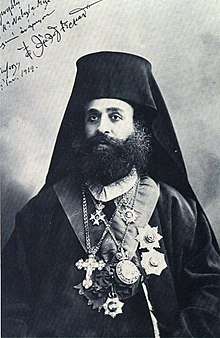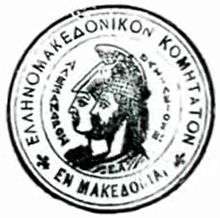Germanos Karavangelis
| Germanos Karavangelis | |
|---|---|
 Portrait | |
| Born |
June 16, 1866 Stipsi, Greece |
| Died |
February 11, 1935 Vienna, Austria |
Germanos Karavangelis (Greek: Γερμανός Καραβαγγέλης, also transliterated as Yermanos and Karavaggelis or Karavagelis, 1866–1935) was born in Stipsi, Lesbos.
He was a metropolitan bishop of Kastoria, in communion with the Ecumenical Patriarchate of Constantinople, from 1900 until 1907, appointed in the name of the Greek state by the ambassador of Greece Nikolaos Mavrokordatos[1] and was one of the main coordinators of the Greek Struggle for Macedonia that had an aim to defend the Greek and Greek Orthodox clerical interests against the Turks and the Bulgarians in then Ottoman Turkish-ruled Macedonia.
He organized armed groups composed mainly of Greek army officers, volunteers brought from Crete, Peloponnese and other parts of Greek populated areas,[1] as well as recruited local Macedonian Greeks[1] such as the chieftain Vangelis Strebreniotis from the village of Srebreni (now Asprogeia), and Konstantinos Kottas, a former member of Internal Macedonian Revolutionary Organization (IMRO) from the village of Rulya (later renamed Kottas by the Greek authorities in his honour).
In 1905, Orthodox priest Kristo Negovani in his native village conducted the divine liturgy in the Albanian Tosk dialect and for his efforts was murdered on orders from Bishop Karavangelis who had condemned during mass the use of Albanian.[2]
Karavangelis succeeded to strengthen Greek aspirations in Macedonia and thus helped the later incorporation of the major part of Macedonia by Greece in the Balkan Wars, for which he is praised as a national hero of the Greek Struggle for Macedonia ("makedonomachos"). He is the author of the book of memoirs "The Macedonian Struggle" (Greek: Ο Μακεδονικός Αγών).
See also
- Greek Struggle for Macedonia
- Pavlos Melas
- (in Russian) Амасийская митрополия. Википедии. ("Metropolis of Amasya".)
| Eastern Orthodox Church titles | ||
|---|---|---|
| Preceded by Unknown |
Bishop of Pera 1896 – 1900[3] |
Succeeded by Unknown |
| Preceded by Athanasios Kapouralis |
Metropolitan of Kastoria 1900 – 1908 |
Succeeded by Ioakeim Vaxevanidis |
| Preceded by Anthemios Alexoudis[4] |
Metropolitan of Amaseia 5 February 1908 – 27 October 1922[5] |
Succeeded by Spyridon Vlachos |
| Preceded by Spyridon Vlachos[5] |
Metropolitan of Ioannina 1922 – 1924 |
Succeeded by Spyridon Vlachos[5] |
| Preceded by – |
Exarch of Hungary and Central Europe (Metropolis of Austria)[note 1] and Titular Metropolitan of Amaseia[note 2] 12 August 1924 – 10 February 1935[5] |
Succeeded by Unknown |
Notes
- ↑ Since 1924 all of the Greek parishes in the territories of Austria, Hungary and Italy came under the jurisdiction of the Patriarchate of Constantinople. However it was only in 1963 that the Greek Orthodox Metropolis of Austria was formally organized.
- ↑ "Metropolitan Germanus was condemned to death in absentia by the Turkish authorities on June 7, 1921 and subsequently could not return to Turkey. He remained in Vienna as Exarch of Central Europe of the Ecumenical Patriarchate during the period 1924–1935."[5]
References
- 1 2 3 (in Greek) Γερμανού Καραβαγγέλη. "Ο Μακεδονικός Αγών (Απομνημονεύματα), Εταιρία Μακεδονικών Σπουδών, Ίδρυμα Μελετών Χερσονήσου του Αίμου".Θεσσαλονίκη. 1959.
- ↑ Blumi, Isa (2011). Reinstating the Ottomans, Alternative Balkan Modernities: 1800–1912. New York: Palgrave MacMillan. p. 167. ISBN 9780230119086. ""Negovani’s actions caused institutional responses that ultimately intensified the contradictions facing the church and its imperial patron. In the end, Papa Kristo Negovani was murdered for his acts of defiance of the explicit orders of Karavangjelis, the Metropolitan of Kastoria, who condemned the use of Toskërisht during mass."
- ↑ (in Greek) Τάσος Αθ. Γριτσόπουλος. "Γερμανός. Ὁ Καραβαγγέλης." Θρησκευτική και Ηθική Εγκυκλοπαίδεια (ΘΗΕ). Τόμος 4 (Βυζάντιον-Διοκλής). Αθηναι – Αθαν. Μαρτινος, 1964. σελ. 400–402.
- ↑ (in Greek) Αλεξούδης, Άνθιμος. Academic Dictionaries and Encyclopedias - Dictionary of Greek. 2013. Retrieved 25 August 2014.
- 1 2 3 4 5 Kiminas 2009, pp. 97.
Sources
- Metropolitan of Kastoria Germanos Karavangelis. Foundation of the Hellenic World (FHW). Retrieved: 25 August 2014.
- Basil C. Gounaris. Social cleavages and national "awakening" in Ottoman Macedonia. East European Quarterly 29 (1995), 409-426.
- Basil C. Gounaris. Preachers of God and martyrs of the Nation: The politics of murder in ottoman Macedonia in the early 20th century. Balkanologie. Vol. IX, n° 1-2 | décembre 2005. Retrieved 27 August 2014.
- Basil C. Gounaris. "IX. National Claims, Conflicts and Developments in Macedonia, 1870-1912." In: Ioannis Koliopoulos (Ed.). The History of Macedonia. Thessaloniki: Musesum of the Macedonian Struggle, 2007. pp. 183–213.
- Douglas Dakin. The Greek struggle in Macedonia, 1897-1913. Thessalonikē: Institute for Balkan Studies, 1966. 538 pp.
- Kiminas, Demetrius (2009). The Ecumenical Patriarchate: A History of Its Metropolitanates with Annotated Hierarch Catalogs. Wildside Press LLC.
- Dimitris Livanios. "'Conquering the souls': nationalism and Greek guerrilla warfare in Ottoman Macedonia, 1904-1908." BMGS 23 (1999) 195-221.
- Julian Allan Brooks. "Shoot the Teacher!" Education and the Roots of the Macedonian Struggle." Thesis submitted in partial fulfillment of the requirements for the degree of Master of Arts. Simon Fraser University, Fall 2005. 191 pp.
- Lora Gerd. Russian Policy in the Orthodox East: The Patriarchate of Constantinople (1878-1914). De Gruyter Open, 2014. p. 10. ISBN 9788376560328
- Olga Balytnikova-Rakitianskaia. Pontian Genocide. ORTHODOXY IN THE WORLD (www.pravmir.com). May 19, 2010, 14:45. Retrieved 27 August 2014.
Greek Sources
- (in Greek) Πάνος Ν. Αβραμόπουλος. Μητροπολίτης Γερμανός Καραβαγγέλης - Ο ρασοφόρος Ακρίτας. Romfea.gr. Σάββατο, 11 Μαΐου 2013. Retrieved 25 August 2014.
- (in Greek) Μητροπολίτης Καστορίας (1900-1908), Γερμανός Καραβαγγέλης. Ιερά Μητρόπολη Καστοριάς (I.M. Kastorias). Retrieved: 26 August 2014.
- (in Greek) ΜΗΤΡΟΠΟΛΙΤΗΣ ΓΕΡΜΑΝΟΣ ΚΑΡΑΒΑΓΓΕΛΗΣ (1866-1935). Stipsi, Lesvos. Retrieved: 25 August 2014.
- (in Greek) Καραβαγγέλης, Γερμανός. Academic Dictionaries and Encyclopedias - Dictionary of Greek. 2013. Retrieved 25 August 2014.
- (in Greek) Τσαγκάρης, Παναγιώτης (Θεολόγος). Γερμανός Καραβαγγέλης. Ο Παπαφλέσσας της Λέσβου. Διακόνημα (Diakonima.gr). 18 Μαΐου 2010. Retrieved: 26 August 2014.
- (in Greek) Τάσος Αθ. Γριτσόπουλος. "Γερμανός. Ὁ Καραβαγγέλης." Θρησκευτική και Ηθική Εγκυκλοπαίδεια (ΘΗΕ). Τόμος 4 (Βυζάντιον-Διοκλής). Αθηναι – Αθαν. Μαρτινος, 1964. σελ. 400–402.
- (in Greek) Ψάρας, I., "O Γερμανός Kαραβαγγέλης και η ορθόδοξη Eλληνική Kοινότητα της Bενετίας (1924-1935)". Θησαυρίσματα 14 (1977), σελ. 275-287.
Related Sources
- Anastas Vangeli. Nation-building ancient Macedonian style: the origins and the effects of the so-called antiquization in Macedonia. Nationalities Papers: The Journal of Nationalism and Ethnicity, Volume 39, Issue 1, 2011. pp. 13–32.
- Panayiotis Diamadis. "Why Macedonia Matters." AHIF POLICY JOURNAL. Winter 2012-13. pp. 1–18.
- Victor Roudometof. Collective Memory, National Identity, and Ethnic Conflict: Greece, Bulgaria, and the Macedonian Question. Greenwood Publishing Group, 2002. 265 pp. ISBN 9780275976484
External links
- Leonidas Papazoglou. The Bishop of Kastoria Germanos Karavangelis with Turkish Officers and Soldiers. Museum Syndicate (MS). Retrieved: 27 August 2014.
| Wikimedia Commons has media related to Germanos Karavangelis. |
